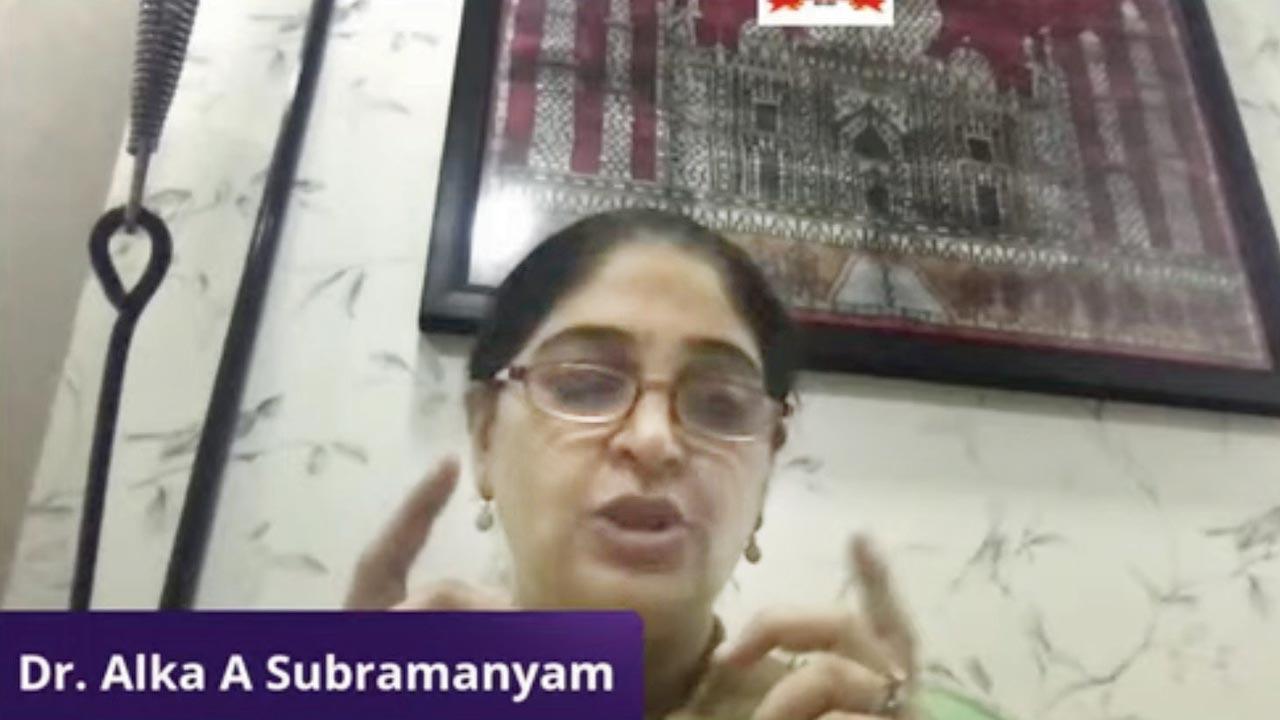Expert points to children and their challenges as pandemic’s tail continues to wag; urges recognition of and acting on red flags

Dr Alka Subramanyam
A not-for-profit trust called V-CAN and the Nair Hospital came together as part of the latter’s centenary year initiative for a virtual social sanchar, or interactive talk show recently. The topic was ‘Young Minds in Troubled Times.’
It featured expert Dr Alka Subramanyam, associate professor psychiatry, BYL Nair Hospital on the challenges that children and youth face as the Covid-19 outbreak wears on. Her talk had a doff of the hat to youngsters, who had shown an ingenuity that adults struggled to, in coping with the social interaction gaps brought on by the outbreak.
V-CAN works to establish linkages with the government authorities and citizens. Indrani Malkani, trustee V-CAN, said at the outset, “During the pandemic we have experienced mental health problems either amongst ourselves or seen a loved one struggle. Now after 1.5 years, lockdown, restrictions, have led to mental stress and fatigue. It is unsurprising that the youngest amongst us have been hit the hardest. Children and young adults have to cope with an increasing set of challenges. If we are to make robust mental health care a reality for young minds we need to be well educated.”
Both sides
While technology has bad press at times, Dr Subramanyam handed it to technology, which was why she said, “We were still connecting through the outbreak. There would be wider gaps everywhere if we did not have tech. The positive side here is certainly more than the negative. Youth has spent considerable time on digital and social media, as they could not attend school or college. These are not just for studies. There you learn values and discipline. You have physical activity and social networking. You learn the art of negotiation.”
Coping mechanism
The expert acknowledged that youngsters did invent some impressive ways to ‘meet’ in cyber space. She said, “During this pandemic we saw children become extremely innovative. Parents came to us saying my child is spending so much screen time I am afraid he or she is becoming addicted. We instead found adolescents would call their friends and say, let us watch a movie together. So, each one is in their own home, and they are all connected to a movie watching together. This is a way to connect, it was ingenious. These were some coping social mechanisms, which were brilliant. Initially because of the novelty of the situation, the first six to eight months were great.”
She went on, “Over time, fatigue has set in. Abuse, both mental and physical violence took place affecting the most vulnerable, children and elders. Child helplines were flooded with calls. They cite statistics showing a definite uptick in violence against children.”
Social beings
She stated there are children who have never been to school. She said, “We have younger children who now think this is normal. We have to work very hard to see that they learn to socialize with each other. Experts have set guidelines about how schools can re-open. In the time that they are in school, the focus should not be academics. Academics can be the focus online. In school, there should be emphasis on projects, perhaps that foster socialization. If we have vaccines coming for children and if we teach them COVID apt protocol, we have to overcome this fear as parents and understand that it is important for them to go out now.”
The doctor said, “When you are vaccinated you are protected to a large extent. We are fortunate now that the pandemic may change its face, it is going to be a virus like any other. Once the vaccines come for them, we must encourage children to be vaccinated and then they can go out.”
She stressed being dismissive about a child’s mental problems is callous at best, and can be dangerous at worst. She explained, “We have to stop thinking how can a child be sad, have depression? It can happen. It is important you recognize it and treat the child. If a child or adolescent voices suicidal thoughts, do not laugh it off. It may have been said in rage or there is no intention of acting upon it. Let the professional decide. This means you have heeded the red flag and acted upon it.” Words of wisdom for both these times and beyond the pandemic.
 Subscribe today by clicking the link and stay updated with the latest news!" Click here!
Subscribe today by clicking the link and stay updated with the latest news!" Click here!










